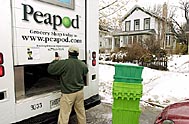Associated Press
CHICAGO — The future of grocery shopping, as seen through the crystal balls of Peapod Inc. and other Internet grocers, will be full of people like Sarah Thurber.
Once a week or so, the sometime business consultant and full-time mother of two young children fills the family pantry by sitting down at her computer for 15 minutes.
 |
| Peapod delivery driver A.J. Javier delivers an order of groceries to a home in Evanston, Ill. Javier says his number of deliveries a day varies, but today this is one of 18 stops.
Associated Press |
"It’s terrific," says the 37-year-old Evanston, Ill., woman. "Somebody rings the doorbell and just sets it all on the counter."
Peapod likely has thousands of customers just as satisfied as Thurber — the company has, after all, doubled its annual revenue for eight straight years. But despite that performance, the oldest U.S. cybergrocer has yet to ring up any profits, and doesn’t expect to until late 2003.
Some retail experts think even that time frame may be optimistic.
"The online grocery shopping business is pretty much in shambles," said retail consultant Bill Bishop. "The right strategy doesn’t seem to have emerged."
Built on potential and investors’ lofty expectations, many cyber-grocers crashed in 2000 when the stock market tanked and investment dollars dried up. Roughly half of the 35 online grocers that existed a year ago have disappeared.
Foster City, Calif.-based Webvan Group Inc., which leapfrogged Peapod last year to become the biggest Internet grocer, may be next on the endangered list after losing $173 million in the fourth quarter and acknowledging it is running out of cash.
But rising sales and Americans’ growing ease with online ordering provide more than a glimmer of hope for those companies that survive the shakeout.
Jupiter Research projects online grocery sales to nearly triple this year to $2 billion and to reach $18.5 billion in 2005. Their market share of total U.S. supermarket sales, now less than 1 percent, is seen inching steadily higher.
"There is huge and legitimate demand for this service," said Bishop, president of Willard Bishop, a retail consulting company in Barrington, Ill. "If anybody can figure out how to put it together and make money, it’s going to be a gusher."
Peapod has been trying since 1989, when brothers Andrew and Thomas Parkinson — today’s chairman/chief financial officer and chief technology officer, respectively — founded it as a grocery-picking service in Evanston, Ill.
Expanding steadily throughout the 1990s and moving to the Internet, all the while remaining unprofitable, it appeared to run out of luck when the economy stumbled.
"Peapod made every mistake in the book" up until last year, said Evie Black Dykema, Forrester Research’s senior analyst for online retail. "They had uneven service levels. They had teenage kids roaming through the aisles lackadaisically packing product. They did an ineffective job communicating the value of online grocery shopping."
When then-chief executive Bill Malloy resigned last March after falling ill during exhaustive negotiations to secure money, financiers yanked $120 million in planned financing, and the company was within weeks of going broke.
The stock price crumbled and hasn’t recovered. Trading as high as $16.38 a share in November 1999, it fell under $1 recently on the Nasdaq Stock Market.
Royal Ahold, the $50 billion Dutch supermarket giant, bought a majority stake last April for $73.5 million, so cash and investor impatience no longer pose an imminent threat.
"I’m not worried about profitability," said CEO Marc van Gelder, 39, affirming his Dutch bosses’ long-term commitment. "We’ll get there."
Analysts agree that its partnership with a global supermarket powerhouse has strengthened its Old Economy ties. Peapod now relies increasingly on warehouses stocked with products from two of Royal Ahold’s big East Coast chains: Giant Food and Stop & Shop.
"I’m inclined to think that if anybody’s going to make it, it’ll be Peapod — thanks to mother Ahold," said Ellen Baras, a Chicago-based analyst for William Blair & Co.
In a restructuring last year, Peapod stopped delivering in four markets in Texas and Ohio. It bought out Streamline.com and added southern Connecticut and Washington, D.C., to its four other metropolitan markets: Chicago, Boston, Long Island and San Francisco.
Royal Ahold’s buying power translates to better margins — it grosses about $40 on the average order of $130. But after paying for warehouses, trucks and drivers, nothing’s left.
Van Gelder claims that will change. The Chicago operation will be profitable by the middle of this year, he says, and all of Peapod is projected to break even in 2003.
"We believe we have our house in order and are ready to take off," he said in a recent interview at company headquarters. "Last year was a restructuring year. This is a harvesting year."

Peapod Inc.
Headquarters: Skokie, Ill.
Founded: 1989.
Markets: 6 U.S. metropolitan areas — Chicago, Boston, Long Island, southwestern Connecticut (Greenwich-Stamford-Fairfield), San Francisco, Washington, D.C.
Delivery costs: from nothing to $9.95 per order, depending on market and order size.
Minimum order: $50.
Customers: 120,000.
Average customer: Two-income couple with children, $70,000 household income.
Owner: Dutch supermarket giant Royal Ahold has 58 percent stake.
CEO: Marc van Gelder, 39.
Employees: 960.
Sales: 1999: $73.1 million; 2000: $69.4 million through September.
Net losses: 1999: $28.5 million; 2000: $32.9 million through September. (Fourth-quarter earnings to be announced Feb. 21.)
Source: Peapod Inc.
[back to top] |

